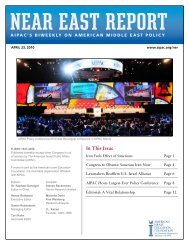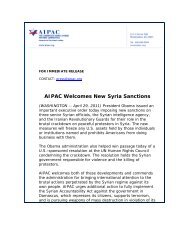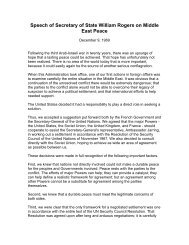2013 Briefing Book - Print Version - Aipac
2013 Briefing Book - Print Version - Aipac
2013 Briefing Book - Print Version - Aipac
Create successful ePaper yourself
Turn your PDF publications into a flip-book with our unique Google optimized e-Paper software.
IRAN<br />
According to the IAEA, Iran continues to experiment with polonium, an element primarily used to<br />
trigger nuclear explosions and continues to block IAEA inspections of numerous nuclear facilities.<br />
For more than three years, Iran has refused IAEA requests to explain any of these activities, other<br />
than to dismiss the information as fabricated. Moreover, Iran reportedly conducted research and<br />
tests on a neutron initiator using uranium deuteride (UD3). The only application for UD3 is as a<br />
neutron source to trigger an atomic chain reaction in a nuclear warhead.<br />
The Green Salt Project, an alleged clandestine Iranian effort focusing on uranium processing, high<br />
explosives and a missile warhead design, remains a matter of serious concern. Iran has failed to<br />
address questions about this project that the IAEA believes are critical to an assessment of the<br />
possible military dimension of the country’s nuclear program.<br />
Iran has also been conducting research and tests on technologies needed to deliver a nuclear<br />
weapon, including the rapid advancement of its long-range ballistic missile and space program.<br />
Iran Faces Tougher Sanctions After Rejecting Outreach Efforts<br />
Upon taking office, President Obama made it a priority to reach out to Iran and seek a dialogue.<br />
Despite the president’s efforts, Iran has failed to engage in significant, substantive talks with the United<br />
States, the IAEA or the P5+1 (the permanent members of the U.N. Security Council, plus Germany).<br />
While the U.S. remains open to talks, Iran’s refusal to engage in serious negotiations or suspend its<br />
nuclear program has led the United States to impose dramatic new sanctions on Tehran.<br />
The United States has imposed progressively escalating rounds of sanctions on Iran since the early<br />
1990s. Initial efforts focused on preventing the transfer to Iran of components that might be used<br />
in its nuclear or ballistic missile programs. More recent sanctions have focused directly on Iran’s<br />
ability to conduct international business and generate revenue from its vast energy resources.<br />
The Iran Threat Reduction Act of 2012, coupled with sanction provisions in the National Defense<br />
Authorization Acts for Fiscal Years 2012 and <strong>2013</strong>, place nearly the entire energy sector of Iran<br />
under sanctions. The laws also effectively cut Iran off from the international financial system.<br />
An important exemption to the sanctions was included in the laws for financial institutions<br />
in countries that significantly reduce their purchases of Iranian oil. Largely as a result of this<br />
provision, Iranian oil exports have been more than halved since the middle of 2012, resulting in<br />
lost yearly revenue to the regime of more than $50 billion.<br />
125








